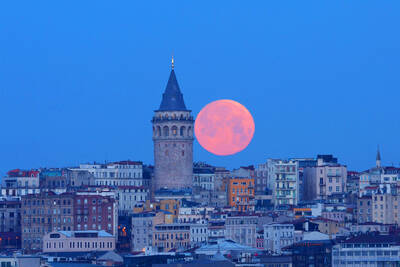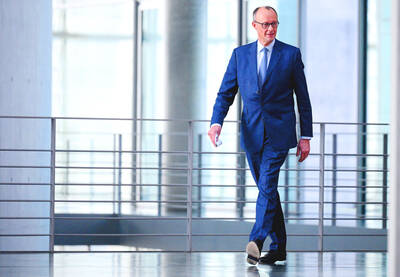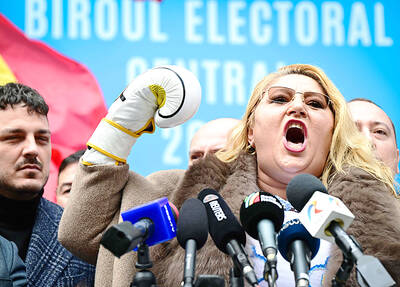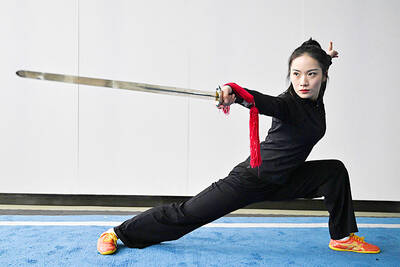Russian President Dmitry Medvedev condemned EU moves to strengthen ties with former Soviet states and called on Europe to help Ukraine pay for its gas supplies at a summit yesterday that failed to overcome glaring differences.
The summit held in Russia’s Far Eastern city of Khabarovsk — the most easterly venue chosen for such a meeting — aimed to raise spirits after ties were frayed by last year’s war with Georgia and the New Year gas crisis with Ukraine.
However smiles and statements of admiration for the beauty of remote Khabarovsk could not hide stark differences, most notably on the EU Eastern partnership plan for ex-Soviet nations.
The partnership aims to strengthen political and economic ties between the 27 EU nations and Armenia, Azerbaijan, Belarus, Georgia, Moldova and Ukraine.
Czech Republic President Vaclav Klaus, holder of the rotating EU presidency, said the EU had sought to reassure Russia over the plan but Medvedev said some of the states involved “see this as a partnership against Russia.”
“I’ll put it succinctly. We tried to convince ourselves but in the end we couldn’t,” Medvedev said.
“The European Union considers Russia to be its strategic partner. We must do something to make this real and not just a formal proclamation,” Klaus said.
Russia has also made much of Medvedev’s proposal last month for a new global energy charter to replace an Energy Charter Treaty adopted in 1991 to integrate the energy sectors of the former Soviet Union and Eastern Europe.
The EU leaders said they were ready to listen to Russia’s proposals on the energy charter but said there was no reason for entirely ripping up the existing pact.
“We should not throw away agreements that already existed for years,” EU Commission President Jose Manuel Barroso said. “We are open to discussion of the proposals put forward by Russia but building on the existing agreements ... without destroying, without putting under pressure the system that already exists.”
Medvedev reaffirmed Russia’s objections to the existing charter and said it would not take part in it.
Russia’s January gas crisis with Ukraine saw consumers in several EU states deprived of Russian gas for almost two weeks, prompting a warning by Barroso at the time about Russian reliability as an energy supplier.
“It would not be good if such a [gas] crisis happened again,” Barroso said at the time.
Worryingly for the EU, Medvedev said Russia doubted Ukraine’s ability to meet its gas payment obligations, the key factor in triggering the January crisis.
“We have doubts about Ukraine’s ability to pay,” Medvedev said, referring to US$4 billion needed by Ukraine to replenish its gas storage reservoirs.
The choice of Khabarovsk as summit venue — 6,000km from Moscow but a mere 30km from the Chinese border — is seen as a reminder by Russia of its status as the world’s largest country.
It may also be a warning that Russia — which has made building trade with China a priority — has other partners if the EU proves uncooperative.
Medvedev said earlier the city had been chosen so that the EU leaders — who are coping with a nine-hour time difference and 10-hour flight — “have the opportunity to appreciate Russia’s greatness.”
The two sides are also in the process of negotiating a new basic and legally binding agreement on bilateral ties to replace the existing Partnership and Cooperation Agreement which has run out.
Talks on the new pact, which has concerned some ex-Soviet bloc EU members, were held up by the dispute over the Georgia war, but there have been expectations they could strike a deal by the end of the year.
Russia’s envoy to the EU Vladimir Chizhov indicated however that the two sides were in no hurry.
“Neither Russia nor the EU is going to make deadlines. What counts is the quality of the future document, it needs to go further and be better” than the previous one, he said.

RARE EVENT: While some cultures have a negative view of eclipses, others see them as a chance to show how people can work together, a scientist said Stargazers across a swathe of the world marveled at a dramatic red “Blood Moon” during a rare total lunar eclipse in the early hours of yesterday morning. The celestial spectacle was visible in the Americas and Pacific and Atlantic oceans, as well as in the westernmost parts of Europe and Africa. The phenomenon happens when the sun, Earth and moon line up, causing our planet to cast a giant shadow across its satellite. But as the Earth’s shadow crept across the moon, it did not entirely blot out its white glow — instead the moon glowed a reddish color. This is because the

DEBT BREAK: Friedrich Merz has vowed to do ‘whatever it takes’ to free up more money for defense and infrastructure at a time of growing geopolitical uncertainty Germany’s likely next leader Friedrich Merz was set yesterday to defend his unprecedented plans to massively ramp up defense and infrastructure spending in the Bundestag as lawmakers begin debating the proposals. Merz unveiled the plans last week, vowing his center-right Christian Democratic Union (CDU)/Christian Social Union (CSU) bloc and the center-left Social Democratic Party (SPD) — in talks to form a coalition after last month’s elections — would quickly push them through before the end of the current legislature. Fraying Europe-US ties under US President Donald Trump have fueled calls for Germany, long dependent on the US security umbrella, to quickly

Romania’s electoral commission on Saturday excluded a second far-right hopeful, Diana Sosoaca, from May’s presidential election, amid rising tension in the run-up to the May rerun of the poll. Earlier this month, Romania’s Central Electoral Bureau barred Calin Georgescu, an independent who was polling at about 40 percent ahead of the rerun election. Georgescu, a fierce EU and NATO critic, shot to prominence in November last year when he unexpectedly topped a first round of presidential voting. However, Romania’s constitutional court annulled the election after claims of Russian interference and a “massive” social media promotion in his favor. On Saturday, an electoral commission statement

In front of a secluded temple in southwestern China, Duan Ruru skillfully executes a series of chops and strikes, practicing kung fu techniques she has spent a decade mastering. Chinese martial arts have long been considered a male-dominated sphere, but a cohort of Generation Z women like Duan is challenging that assumption and generating publicity for their particular school of kung fu. “Since I was little, I’ve had a love for martial arts... I thought that girls learning martial arts was super swaggy,” Duan, 23, said. The ancient Emei school where she trains in the mountains of China’s Sichuan Province